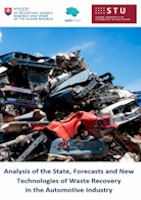|
 |
INTRODUCTION
Dear readers,
The development of new cars reflects the strategy of the EU to produce material and energy-efficient vehicles, including the introduction of cutting-edge ultra-low carbon production technologies in vehicles. The requirements for the minimum weight and maximum strength of the structure placed on current vehicles result in the use of new composite materials that are problematic in terms of recycling. Plastics, non-ferrous metal-bearing materials, the significant growth of electronics and the start of the series production of electric vehicles give rise to new challenges also in the area of recycling. Concerning the critical raw material resources, EU policy determines the trend of the increasing share of secondary raw materials with an emphasis on increasing the level of recycling raw materials of a mineral origin and the efficient material or energy recovery of organic waste.
The Slovak economy still consumes more resources than its natural capacity and therefore has a negative ecological footprint. However, we have significant potential for improving the use of existing resources in waste management, thus it is necessary to focus on promoting research and the development of modern recycling technologies not only in the area of municipal waste but also for industrial waste, as well as the construction of recycling capacities for those commodities that lack or have insufficient recycling capacities.
The generation of waste is logical, although the undesirable consequence of anthropogenic activity related to the flow of energy and materials. Waste is generated in the entire social reproductive process, from the extraction of raw materials and their treatment to technological processing into products and their use. After the value of the product is consumed (after the end of a product’s life cycle), the product itself becomes waste.
The issue of reducing the production of waste and methods for safe, ecological and economically viable waste recovery or disposal is currently one of the most important economic and political problems worldwide. In addition to energy decarbonisation, the European Green Deal also determines the achievement of a climate-neutral and clean circular economy. The New EU Industrial Strategy and the New EU Circular Economy Action Plan order the member states to monitor the priority waste observation areas as well as to monitor the progress for municipal waste and for waste containing substances that may replace natural resources by their recycling. The primary objective of this policy is to gradually turn the produced waste into the main source of raw materials and to leave the not-yet-depleted natural resources as a consumption reserve for the future.
An important stage in the EU’s progress towards sustainability and a recycling society was the adoption of the programme Towards a Circular Economy: A zero waste programme for Europe.
The principal vision defined in the Environmental Policy Strategy of the Slovak Republic until 2030 is to achieve a better quality of the environment and a sustainable circular economy based on the thorough protection of the components of the environment and only the minimal utilisation of non-renewable natural resources and hazardous substances. The issue of waste management belongs among the priority environmental challenges in Slovakia and the preferred areas of the environmental policy until 2030.
Dear experts, as well as the technical and non-expert public,
In your hands is a publication produced by the “University and Industrial Research and Education Platform of the Recycling Society (hereinafter referred to as ‘UNIVNET’)” – an association focusing its activities on progressive waste recovery technologies in the automotive industry in the Slovak Republic. The UNIVNET association was established upon an agreement between the Ministry of Education, Science, Research and Sport of the Slovak Republic (MESRaS SR) and the leader of the association – the Slovak University of Technology in Bratislava (STU BA). In addition to the STU BA (Faculty of Mechanical Engineering of the Slovak University of Technology in Bratislava), the association includes other universities, in particular: Technical University of Košice (TU KE, Faculty of Mechanical Engineering, and TU KE, Faculty of Materials, Metallurgy and Recycling), University of Economics in Bratislava (EU BA, Faculty of National Economy, and EU BA, Faculty of Economic Informatics), University of Žilina (UNI ZA, Faculty of Mechanical Engineering), Technical University in Zvolen (TU ZVO, Faculty of Technology) and the Automotive Industry Association of the Slovak Republic (AIA SR).
The main aim of the association consists of prognostic and research and development activities in the search for new technologies and methods for the maximum efficient recovery of waste, especially in the automotive industry, to minimize negative impacts on the environment and save the primary resources of energy and raw materials.
The present monograph is a thematic continuation of monographs issued in 2020 under the title “Stav a vízie zhodnocovania odpadov z automobilového priemyslu SR” (The condition and visions of automotive industry waste recovery in the Slovak Republic) and in 2021 “Progresívne technológie zhodnocovania odpadov v automobilovom priemysle” (Progressive technologies of waste recovery in the automotive industry).
We believe that the monograph of the UNIVNET association will capture your attention and even become a certain inspiration for those who deal with the recovery and recycling of cars after the end of their life cycle and others.
Editors
Dr.h.c. prof. Ing. Ľubomír ŠOOŠ, PhD. Dr.h.c. mult. prof. Ing. Miroslav BADIDA, PhD.
